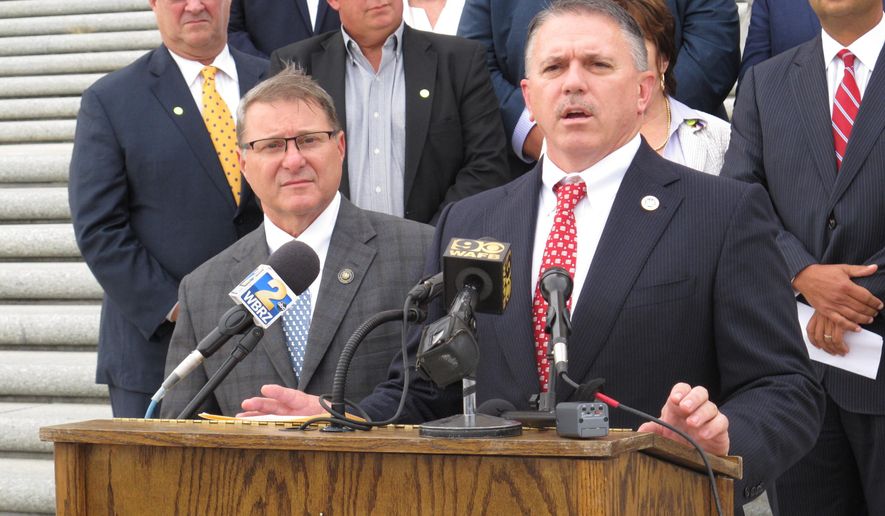BATON ROUGE, La. (AP) - The direct strike at Louisiana Gov. John Bel Edwards’ coronavirus restrictions didn’t come through legislative action in the special session that Republican lawmakers called primarily to undermine the Democratic governor’s rules.
Instead, House Republicans started their legal battle over Edwards’ mask mandate, crowd size limits and business rules through a law that already existed, allowing a majority of lawmakers in one chamber to revoke a governor’s emergency orders through a petition. A court is expected to decide whether that action sticks and the governor’s restrictions are jettisoned.
It took legislators nearly four weeks in a session that cost taxpayers an estimated $1 million to end up right where they started - focused on a petition that a group of conservative House GOP lawmakers had been circulating for months.
As the House and Senate adjourned their special session Friday and headed home, Republican lawmakers resisted suggestions the gathering didn’t amount to much. They pointed to hurricane recovery spending decisions, the start of efforts to refill the bankrupt unemployment trust fund and other bills that reached the governor’s desk.
“We got a lot accomplished to help a lot of people,” House Speaker Clay Schexnayder, a Gonzales Republican, told his colleagues on the final day without listing those achievements.
Lake Charles Republican Sen. Ronnie Johns talked of the $20 million in state surplus cash steered to jumpstarting repairs to state-owned buildings damaged by hurricanes Laura and Delta. He praised lawmakers for ensuring that students who evacuated to other states because the hurricanes wrecked their homes will be eligible for the TOPS college tuition program.
Senate President Page Cortez, a Lafayette Republican, pointed to the hurricane recovery measures and the Legislature’s decision to keep unemployment benefits and tax rates on businesses that pay into the unemployment trust fund at their current levels, despite the fund’s bankruptcy. They also steered $85 million to help pay for benefits, though that’s not nearly enough to reach fund solvency.
Cortez also noted the cuts made to licensing and permitting fees for businesses that had to temporarily stop operations during the pandemic.
“All of these things could not have been done had we not come into session, so while the focus is a lot on (Edwards’) oversight and the governor’s emergency orders, I just hope that we can present that there was a lot more work that got done,” Cortez said.
Still, Cortez acknowledged those noncontroversial items could have passed more quickly without the debates over Edwards’ coronavirus rules.
Republican lawmakers convened the nearly four-week session with many of them talking about curbing the governor’s COVID-19 restrictions on businesses, high school sports and other activities.
The House and Senate, however, diverged over the constitutional limits of what they could do to revoke Edwards’ rules and insert themselves more heavily into emergency actions.
The deal finally struck between Republicans in the two chambers would give lawmakers the ability to nullify individual pieces of a governor’s emergency order by a majority vote through mailed ballot, for any emergency declaration extended beyond 30 days.
But Edwards indicated the measure wouldn’t survive his veto pen.
Meanwhile, the final legislation fell far short of what some conservative Republicans wanted to see in the special session. All House Republican efforts to immediately end the governor’s coronavirus restrictions - or suspend his administration’s enforcement ability of them - stalled in the Senate.
“I hate that we were forced to initiate a petition to where we really don’t know what the courts are going to rule on that. So it’s still iffy,” said Rep. Dodie Horton, a Haughton Republican.
Some GOP lawmakers suggested the session’s sharp House and Senate disagreements about whether and how to overturn Edwards’ restrictions - and the strong resistance from the governor to anything that would chisel away at his authority - paved the way for the petition to win support.
What is certain is the special session created new fissures between a House and Senate that has repeatedly talked of working together, worsened the relationship between the governor’s office and House Republicans and carried a hefty price tag for modest accomplishments.
And the coronavirus rules that drove many lawmakers to call for the session remain in place, likely awaiting a judge’s decision on whether they can be enforced.
___
EDITOR’S NOTE: Melinda Deslatte has covered Louisiana politics for The Associated Press since 2000. Follow her at http://twitter.com/melindadeslatte.
___
Follow AP coverage of the pandemic at https://apnews.com/VirusOutbreak and https://apnews.com/UnderstandingtheOutbreak.




Please read our comment policy before commenting.